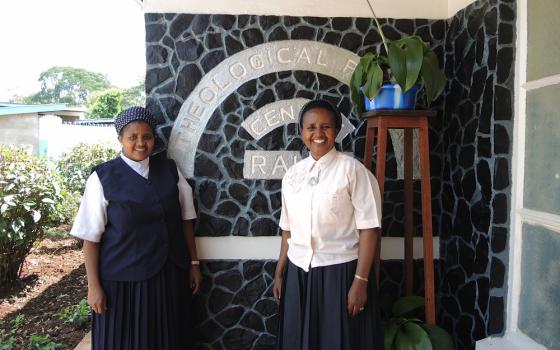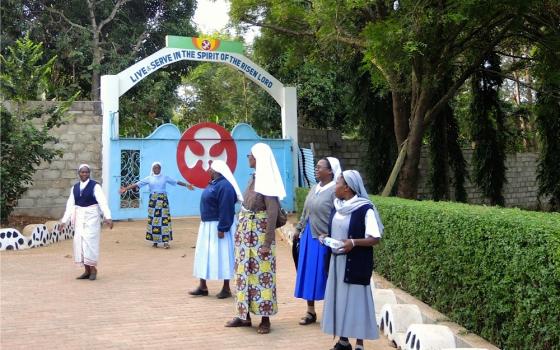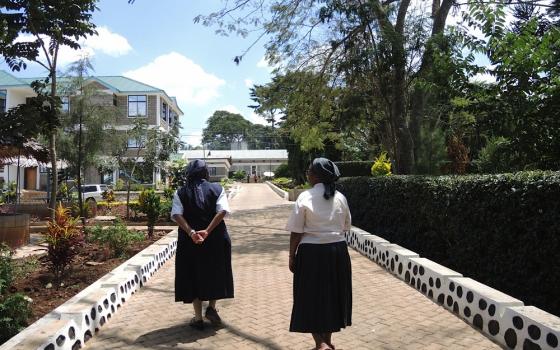When there’s a break in the clouds in northern Tanzania, clear skies reveal the most stunning panorama of mountains. The snow-peaked plateau of Mt. Kilimanjaro is in one direction, and the stark outlines of Mt. Meru is in the other. Tucked between the peaks and fortified with clear mountain air, the Holy Spirit Sisters built the Theological Pastoral Center of Rauya, a tranquil theology college.
Men and women religious from around central Africa come to deepen their spiritual education surrounded by gardens and peaceful quiet. Sr. Theresia Fidelis Tarimo, 49, is the theology teacher at the center. She studied philosophy and theology for her bachelor’s degree in Tanzania and completed her doctorate in moral theology in Rome at St. Thomas Aquinas University-Angelicum. Global Sisters Report recently visited the Rauya center to hear more about teaching theology in Tanzania.
GSR: What do you teach in your theology class?
Tarimo: Oh, a lot of things! The syllabus includes scripture, church history, moral theology, bioethics, dogmatic theology like the Trinity and Christology [the study of Jesus’ life], Pauline literature, synoptic gospels [of Matthew, Mark and Luke], the Pentateuch [first five books of the Bible], canon law, ecclesiology [study of the church], prophetic literature, theological anthropology [the study of humans in their relationship to God], epistemology [philosophy of knowledge], theodis [study of God from a philosophical perspective on good and evil], theology of missions, logic, and the history of philosophy. Then we also have practical parts of the course like teaching methodology for primary and secondary school, developmental psychology, administration, leadership, English and computers.
All this in three years?
The diploma program in actually two years. If a student has finished Form 4 with good marks [the equivalent of 10th grade, which in the Tanzanian system is the end of regular schooling as only college-bound students do the last two years of high school], then they only do two years. If they haven’t, they do an additional year. The program is to train catechist teachers and formators. We have mostly sisters and sometimes a few priests. We also have a six-month program for formees [novices and candidates] for all congregations. Right now we have 34 students. Currently, we aren’t an accredited institution, though we’re in the process of getting our government accreditation. The diploma is recognized by the Tanzania Episcopal Conference [Tanzania’s organization of bishops]. Also in the future we hope to receive lay people to train as catechists, but we need to build a dormitory for them. We need more catechists because the vocations are going down. We need to empower the lay people so they can teach religion in different schools and also solve marriage problems in their villages.
What is your favorite part to teach?
I like moral theology and also bioethics. I ask the students, what is a moral person? How can we analyze the morality of a certain act? There are many subsets, like sexual ethics, also about the family. What is God’s plan for the family, and what are the duties of the parents towards their children? It’s very broad, and you cannot teach all of this in three years. We only pinpoint the most basic things that the students will need for their missions.
Are there any parts of the course that are unique to Tanzania and Central Africa?
We have students from Malawi, Ethiopia, Zambia, Uganda and Kenya as well as Tanzania. Moral theology is not subjective. We try to follow what the church says when we teach moral theology, so it’s not something that you change based on culture. However, there are certain values here in Africa that we try to highlight how they are supported by the moral theology of the church. Generosity, for example. This is a moral norm that is found in African culture that a person must be welcomed at your home, even without an appointment. The person must be ready to accept you with accommodation or whatever. That’s an African value; you can’t deny it to a person. We also have the values of solidarity and commonality. When there’s a death, everyone feels responsible to go and console [the friends and family left behind].
What is your biggest challenge?
The biggest challenge is educational background of the sisters coming here. Most didn’t pass their secondary exams [to graduate 10th grade]. It’s very difficult for them to keep up with the studies. Also, instruction is in English. This is difficult for sisters from Tanzania [Swahili is used for everyday conversation in Tanzania. English is learned as a third language after a local language and Swahili, so many sisters in Tanzania speak only rudimentary English]. Also, congregations are not sending sisters for this course because they can’t pay fees. But for someone to be a formator or a catechist, they need to get the knowledge. The great challenge in teaching religion is the new generation is quite difficult. Technology creates so many questions. If you try to teach without enough knowledge, the teachers will be challenged, so that’s why it’s important to study and get the knowledge.
What is the challenge with the new generation?
In our time, there were no TVs or smartphones. Now this young generation from 3 years old, they’re watching TV. Parents might not be aware that the kids are watching things that are beyond their age. So when I teach the Sixth Commandment [Thou shalt not kill], the kids will say, “Wait, we saw this in the movies that adults do this. So why does God forbid this?” you need the theological knowledge to explain. Why are certain kinds of sexual intercourse not permitted and why did God have the plan of this institution of marriage? So you have to have knowledge about that. Previously, before this media, you’d tell them and they’d follow exactly what you are telling them — “Do not do this because God forbid this.” And they would accept that. Nowadays, they will ask you why, and you need to have something which can properly explain it to them so they can agree with you. It’s good that children are more exposed to the worldly things and they can use the Internet and technology. I wouldn’t want to go back in time. But the parents are not aware. They need to set healthy limits.
Any other advice?
People should pursue theological studies for their own self-knowledge. Even at a secular institute, or about any religion that is against immorality, we don’t need to limit ourselves to only Christian morality. But we can’t have a society without moral principles. There’s a saying nowadays that it’s better to come across a wild beast than a human at night, because at least you know how a wild animal will react. It shouldn’t be like this.
[Melanie Lidman is Middle East and Africa correspondent for Global Sisters Report based in Israel.]




